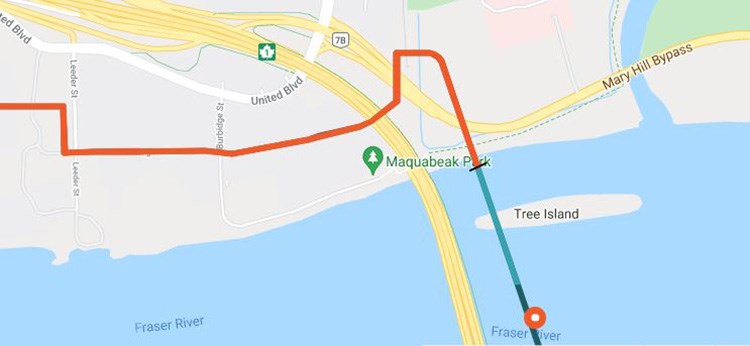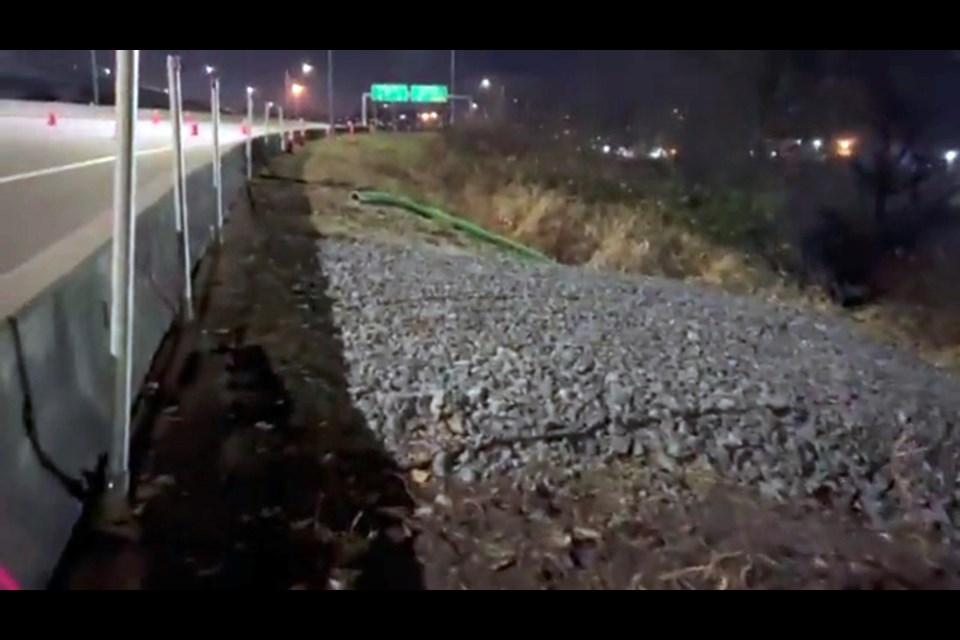Westbound traffic is only partially getting through along a major Port Coquitlam route for a third straight day.
An apparent "sinkhole" is believed to be the reason for the continued closure on the Mary Hill Bypass between Shaughnessy Street and United Boulevard and has been brought to the attention of many groups, including one against the construction of the Trans Mountain pipeline (TMX).
Protect the Planet Stop TMX shared a video on social media of the site where crews appeared to be set up in trying to repair the area this week.
It claims a lack of confidence as the incident took place in the path of the $12.6-billion pipeline's construction.
"[We] just got off the phone with the Ministry of Transportation and they say... 'the sink hole has been filled, paving must occur and then they must measure and monitor ground vibration to ensure the fix has fully settled.' If this is just the construction of the pipeline expansion, how confident can we be about it when there is oil running through it."
Wonder why traffic is so bad at Mary Hill bypass? A sink hole opened up directly in line with the tunnel TransMountain is attempting to drill under the Fraser River. They have already filled in the hole and you can see the fresh asphalt. Lane closures ongoing today. pic.twitter.com/MzqvE5AXCV
— PPSTMX (@PPSTMX1) December 3, 2021
The Tri-City News took a drive along the stretch earlier today (Dec. 3). Repairs appeared to be completed with excess gravel off the shoulder and pylons still on the road.
In a statement, Trans Mountain says the recent atmospheric river event — which saw more than 200 mm of heavy rainfall in the most recent downpour— resulted in a "settlement" by Highway 7B and lane closures were put in place out of respect for traffic safety.
"Our engineering team is working on the best way to address the settlement, so it has as little impact on the travelling public as practicable," a spokesperson explains to the Tri-City News, confirming the pipeline is set to go underneath the Mary Hill Bypass twice.

"The settlement area is being repaired. We will continue to monitor as needed."
DriveBC first reported a "pothole" caused the Mary Hill Bypass westbound lanes to completely close early Wednesday morning (Dec. 1). It's been open since except for one lane exiting onto Highway 7B.
B.C.'s ministry of transportation and infrastructure explains a "sinkhole" developed in the westbound left lane and confirms it took place over the top of TMX's "recently completed Horizontal Directional Drilling (HDD) project under the Fraser River."
"Ground penetrating radar has revealed an anomaly in the right exit lane to United Boulevard. As a precaution, the right exit lane has been closed to further investigate," a ministry spokesperson tells the Tri-City News.
"The site is being continually monitored. Crews are on site to repair as soon as the full extent of the repair is known on the exit lane and it’s safe to carry out those repairs."
Trans Mountain adds crews are working in this area to install a section of pipe from Surrey to Coquitlam for the construction of the pipeline to Burnaby.
The company explains it's conducting an HDD procedure — a phased approach with a drilling rig on the south side and a staging area on the north near the southwest corner of Colony Farm Regional Park.
Now owned by the federal government, the Trans Mountain pipeline expansion project is slowly making its way from Alberta to the Westridge Marine Terminal in Burnaby.
Last month, one cubic meter of bentonite, a non-toxic clay-based drilling fluid, was "inadvertently released" in a watercourse of the Fraser River.
According to TMX, there have been no impacts to fish and wildlife.





